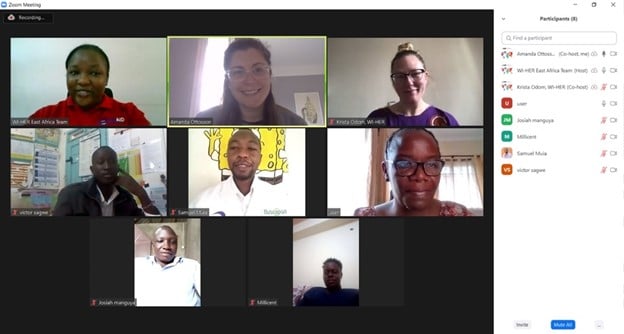By Liz Hall, WI-HER Associate, Communications; Elizabeth Kemigisha, WI-HER Associate, Knowledge Management; Luseka Mwanzi, WI-HER Gender Specialist, Kenya
WI-HER was originally contracted to support the USAID Afya Nyota ya Bonde Project (2018-2021) in Kenya and improve the care and support of gender-based violence (GBV) survivors through in-person training of county government trainers and facility supervisors. One goal of the Project included improving the capacity of facilities to identify and screen all forms of GBV, as well as provide direct services and counseling to address high rates of violence. WI-HER was tasked with supporting health facilities to implement WI-HER’s iDARE methodology, innovated by founder Dr. Taroub Harb Faramand, to create sustainable, localized solutions to continued identification, care, and treatment of GBV survivors after the Project ended.
As the in-person GBV training was about to commence, COVID-19 spread, causing nationwide and global lockdowns. To protect the health and safety of everyone, many projects shut down in-person contact. These COVID-19 restrictions and lockdowns made WI-HER’s in-person GBV training impossible.
While moving to an online environment to conduct GBV trainings posed its own set of challenges, the trainings were critical, especially given the increased rates of GBV during lockdowns because people were trapped with their abusers and excluded from social support systems, especially children and women.
Understanding the importance of the GBV training and rapidly achieving support for survivors and health workers, WI-HER quickly pivoted and adapted the in-person GBV training to a virtual environment using Zoom and WhatsApp. WI-HER also took a phased approach with a low dose, high frequency model. WI-HER applied iDARE to the training methodology to continuously improve their approach and ensure the training caused no harm (or retraumatization) to health workers.
WI-HER supported training participants to form iDARE teams to take learnings from the virtual training and apply them within facilities. Due to the sensitive nature of the training, numbers were low, with a maximum of four people trained per facility and a maximum of 15 people trained in one group.
iDARE teams immediately spread learnings from their trainings into their day-to-day activities, such as during staff meetings or organizing brown bag lunches to sensitize and train on GBV identification among clients. iDARE teams then expanded from the virtually trained participants to include additional facility health workers who played a key role in identifying further gaps and barriers in GBV case identification throughout the facility, designing and applying solutions to integrate into their work. Larger teams came together to assess tested solutions, record results (cases of GBV identified, treated, and referred where applicable), and expand successful solutions.
As a result of applying iDARE to create an online GBV training plan, remarkable improvements in GBV identification and care based on the minimum package were achieved in eight high burden facilities in Kenya. Health workers felt better equipped and more supported by supervisors and colleagues, and GBV survivors received the treatment and care they needed, despite the many challenges posed by the pandemic.
By pivoting to a virtual environment for training, WI-HER not only successfully completed the GBV training but supported facilities and county governments to upgrade their GBV tools from only sexual violence to all four forms of violence. As a result, all eight facilities improved the management and identification of all GBV survivors by 641% and male GBV survivors by 2,176% in 10 months.
The first phase of the training included building the capacity of participants on how to use the virtual platform, a critical step to ensure technology was not a barrier to learning. Gender and GBV sensitizations were frequently conducted, as were lectures and videos, along with the use of interactive breakout groups to work through practical case studies. Training sessions were staggered, with coaching sessions held in between sessions to practically apply skills from the training in their contexts. Once the six-week training was finalized, WI-HER followed up by coaching iDARE teams, mostly through WhatsApp.
While the virtual training solved many challenges of conducting GBV training in a safe way, using technology posed its own challenges; some facilities had limited Internet; sessions were more frequently canceled/rescheduled; and verifying facility data can be difficult online. To address scheduling challenges, informing facility staff and supervisors that the training will take place virtually can ensure buy-in so they allow their staff to participate in a quiet, distraction-free environment.
Most importantly, GBV trainings are extremely sensitive and can be retraumatizing for those who have been subjected to violence and/or supported traumatic cases of violence. WI-HER trainers took the GBV training slow, with video always on to look for signs of retraumatization. In multiple sessions, the training had to be paused due to retraumatization of participants. WI-HER then identified counseling and support services for individuals in need and took deliberate mental health breaks throughout to ensure the safety of all participants.
Because of the challenges created by COVID-19, care and treatment of survivors–as well as support of health workers–was needed more than ever. Using their innovative iDARE methodology, WI-HER managed to pivot and adapt the training rapidly to an online environment, ensuring health workers were properly trained, and survivors received the care they needed.

The iDARE teams from Molo sub-county hospital, Rongai health center, Kitengela subcounty hospital, and Nakuru Provincial General Hospital met virtually for a learning session with the WI-HER team.







